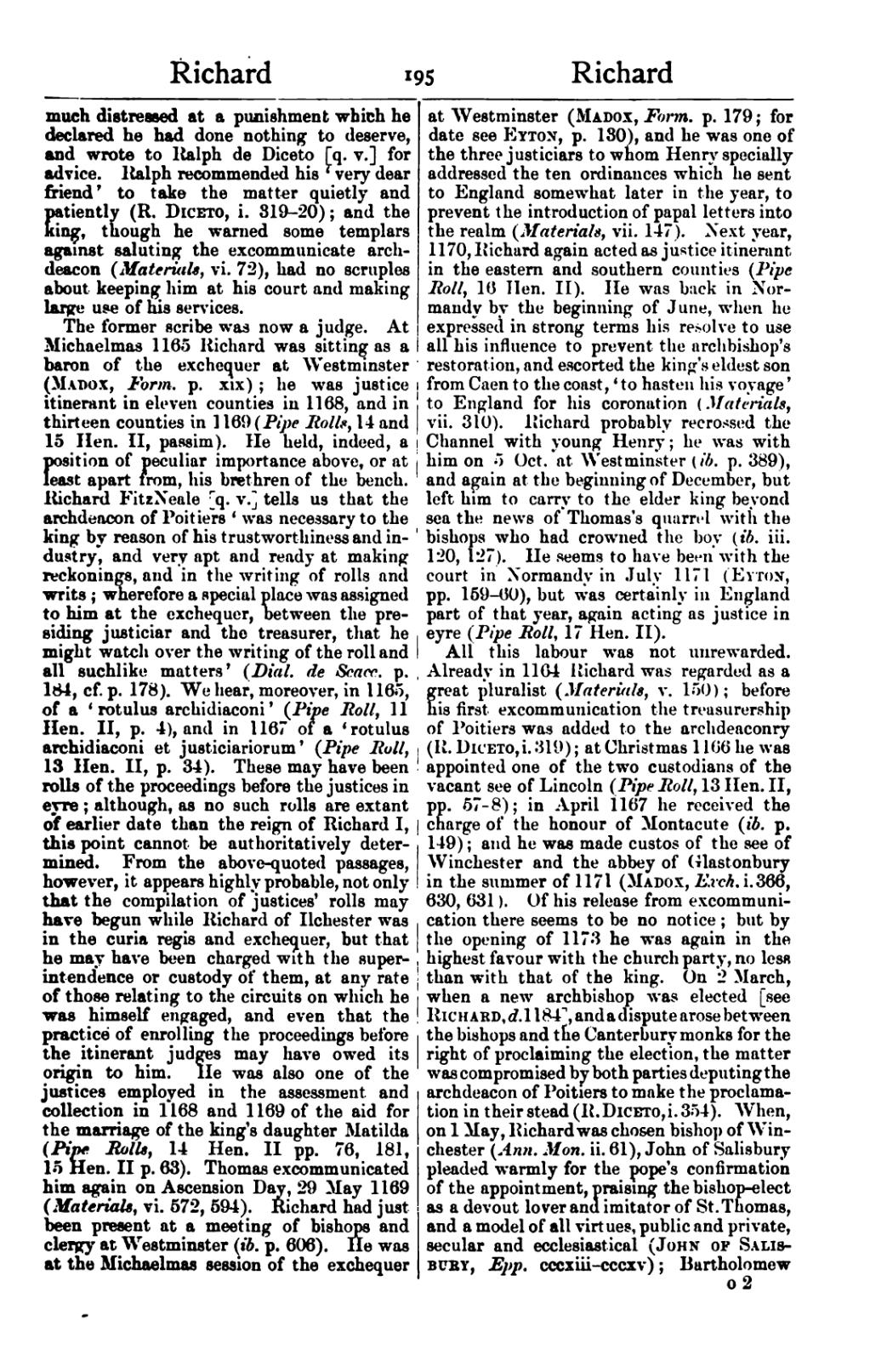much distressed at a punishment which he declared he had done nothing to deserve, and wrote to Ralph de Diceto [q. v.] for advice. Ralph recommended his `very dear friend' to take the matter quietly and patiently (R. Diceto, i. 319-20); and the king, though he warned some templars against saluting the excommunicate archdeacon (Materials, vi. 72), had no scruples ahout keeping him at his court and making large use of his services.
The former scribe was now a judge. At Michaelmas 1165 Richard was sitting as a baron of the exchequer at Westminster (Madox, Form. p. xix); he was justice itinerant in eleven counties in 1168, and in thirteen counties in 1169 (Pipe Rolls, 14 and 15 Hen. II, passim). He held, indeed, a position of peculiar importance above, or at least apart from, his brethren of the bench. Richard FitzNeale [q.v.] tells us that the archdeacon of Poitiers `was necessary to the king by reason of his trustworthiness and industry, and very apt and ready at making reckonings, and in the writing of rolls and writs; wherefore a special place was assigned to him at the exchequer, between the presiding justiciar and the treasurer, that he might watch over the writing of the roll and all suchlike matters' (Dial de Scace. p. 184, cf. p. 178). We hear, moreover, in 1165, of a `rotulus archidiaconi' (Pipe Roll, 11 Hen. II, p. 4), and in 1167 of a `rotulus archidiaconi et justiciariorum' (Pipe Roll, 13 Hen. II, p. 34). These may have been rolls of the proceedings before the justices in eyre; although, as no such rolls are extant of earlier date than the reign of Richard I, this point cannot be authoritatively determined. From the above-quoted passages, however, it appears highly probable, not only that the compilation of justices' rolls may have begun while Richard of Ilchester was in the curia regis and exchequer, but that he may have been charged with the superintendence or custody of them, at any rate of those relating to the circuits on which he was himself engaged, and even that the practice of enrolling the proceedings before the itinerant judges may have owed its origin to him. He was also one of the justices employed in the assessment and collection in 1168 and 1169 of the aid for the marriage of the king's daughter Matilda (Pipe Rolls, 14 Hen. II pp. 76, 181, 15 Hen. II p. 63). Thomas excommunicated him again on Ascension Day, 29 May 1169 (Materials, vi. 572, 594). Richard had just been present at a meeting of bishops and clergy at Westminster (ib, p. 606). He was at the Michaelmas session of the exchequer at Westminster (Madox, Form. p. 179; for date see Eyton, p. 130), and he was one of the three justiciars to whom Henry specially addressed the ten ordinances which he sent to England somewhat later in the year, to prevent the introduction of papal letters into the realm (Materials, vii. 147). Next year, 1170, Richard again acted as justice itinerant in the eastern and southern counties (Pipe Roll, 16 Hen. II). He was back in Normandy by the beginning of June, when he expressed in strong terms his resolve to use all his influence to prevent the archbishop's restoration, and escorted the king's eldest son from Caen to the coast, `to hasten his voyage' to England for his coronation (Materials, vii. 310). Richard probably recrossed the Channel with young Henry; he was with him on 5 Oct. at Westminster (ib. p. 389), and again at the beginning of December, but left him to carry to the elder king beyond sea the news of Thomas's quarrel with the bishops who had crowned the boy (ib. iii. 120, 127). He seems to have been with the court in Normandy in July 1171 (Eyton, pp. 159-60), but was certainly in England part of that year, again acting as justice in eyre (Pipe Roll, 17 Hen. II).
All this labour was not unrewarded. Already in 1164 Richard was regarded as a great pluralist (Materials, v. 150); before his first excommunication the treasurership of Poitiers was added to the archdeaconry (R. Diceto,i. 319); at Christmas 1166 he was appointed one of the two custodians of the vacant see of Lincoln (Pipe Roll, 13 Hen. II, pp. 57-8); in April 1167 he received the charge of the honour of Montacute (ib. p. 149); and he was made custos of the see of Winchester and the abbey of (Glastonbury in the summer of 1171 (Madox, Exch. i.366, 630, 631). Of his release from excommunication there seems to be no notice; but by the opening of 1173 he was again in the highest favour with the church party, no less than with that of the king. On 2 March, when a new archbishop was elected [see Richard,d.1184], and a dispute arose between the bishops and the Canterbury monks for the right of proclaiming the election, the matter was compromised by both parties deputing the archdeacon of Poitiers to make the proclamation in their stead (R. Diceto, i. 354). When, on 1 May, Richard was chosen bishop of Winchester (Ann. Mon. ii. 61), John of Salisbury pleaded warmly for the pope's confirmation of the appointment, praising the bishop-elect as a devout lover and imitator of St. Thomas, and a model of all virtues, public and private, secular and ecclesiastical (John of Salisbury, Epp. cccxiii-cccxv); Bartholomew
